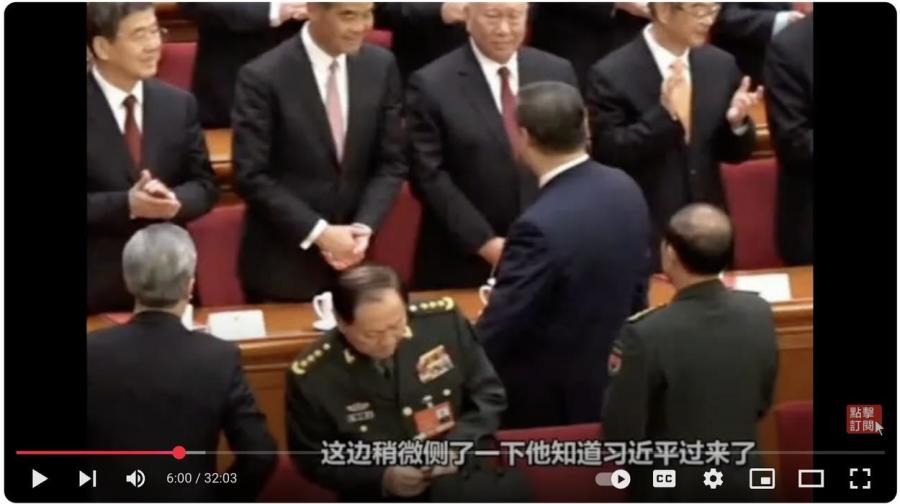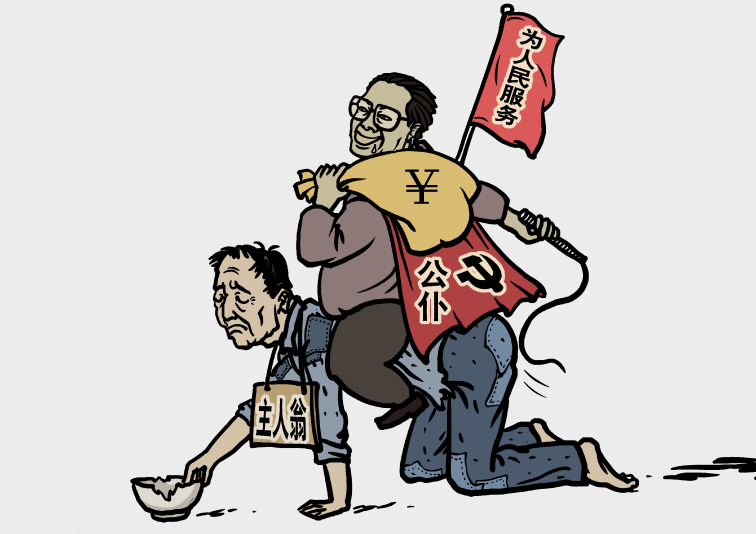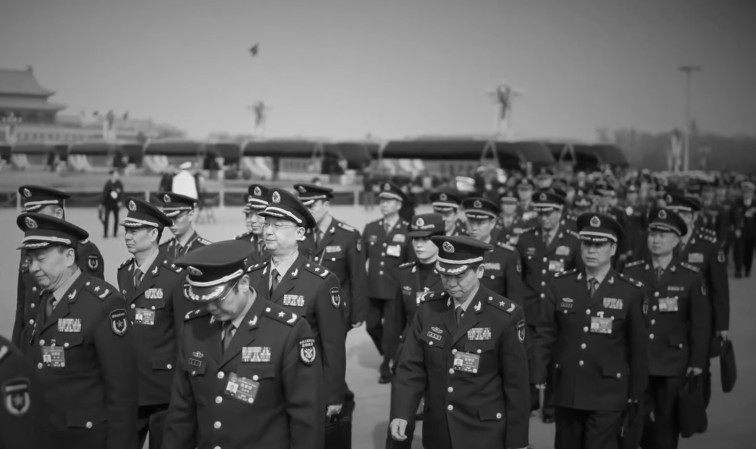During the closing ceremony of the Two Sessions, video footage showed that as Xi Jinping was leaving, several Politburo members, including Vice Chairman of the Central Military Commission (CMC) He Weidong, turned around and stood by their seats to watch Xi depart. However, Zhang Youxia remained facing forward, not even glancing back as Xi walked past behind him. (Screenshot from video)
[People News] Recently, rumours continue to swirl about a Politburo expanded meeting supposedly held on May 14 by the Chinese Communist Party (CCP). It is said the meeting turned into an anti-Xi, de-Xi gathering. So far, the speeches of eight former Politburo Standing Committee members, two current members, one Vice Chairman of the Central Military Commission (CMC), and one Central Committee member have allegedly been leaked.
The eight former Standing Committee members whose speeches were circulated are: Hu Jintao, Wen Jiabao, Wang Qishan, Zhu Rongji, Li Changchun, Wang Yang, Jia Qinglin, and Li Zhanshu. The two current Standing Committee members are Zhao Leji and Wang Huning.
The Central Committee member is Hu Chunhua. The current Vice Chairman of the CMC is Zhang Youxia. Among them, only Jia Qinglin expressed support for Xi Jinping. Wang Huning reportedly offered to resign. Zhao Leji proposed replacing Premier Li Qiang. Zhang Youxia is said to be a core figure in the anti-Xi faction.
Leaked Speeches Begin with Hu Jintao, Wen Jiabao, and Zhang Youxia
Wen Jiabao, in his speech, confirmed that Xi Jinping's removal of Hu Jintao during the 20th Party Congress was a coup, and implied that Li Keqiang’s death was a political assassination by Xi. He called on Xi to take responsibility, apologise, step down, and be investigated by the Central Commission for Discipline Inspection. Wen also urged a return to the reform and opening-up path and the launch of political reform.
Hu Jintao delivered a stern warning, stating that even if it comes to civil war, reform and opening must be saved. He said there was already a preliminary consensus to shift the agenda of the upcoming Fourth Plenum to personnel arrangements for the next leadership. He criticised “cult of personality” and “one-man rule,” calling for a return to collective leadership and a discussion of checks and balances on the General Secretary’s powers.
Zhang Youxia revealed internal secrets in his speech. He said he had already reached retirement age, but Xi persuaded him to stay. He claimed he did two major things for Xi: 1. Deployed troops to Beijing to help maintain stability. 2. Led efforts to publicly support Xi’s re-election. He apologised for both, calling Xi’s third term illegal.
After the 20th Congress, Xi grew suspicious of him. Zhang said he was even threatened by the CMC Office: “You dare oppose Chairman Xi? Do you have a death wish?” Under tremendous pressure, Zhang said he eventually relied on the support of retired elders to purge some of Xi's loyalists in the military.
He directly accused Xi of using anti-corruption as a cover to eliminate dissent, which caused chaos in the military. Zhang pledged to safeguard a "third round of reform and opening-up" and called for Xi to resign from all three of his positions: General Secretary, President, and CMC Chairman.
Zeng Qinghong said he regretted recommending Xi as successor. He admitted that while Xi initially made progress in anti-corruption after the 18th Congress, it later devolved into a dictatorship and a cult of personality. Xi’s constitutional amendments and bid for indefinite rule caught everyone off guard. Zeng also criticised Xi’s COVID lockdown policies, which prevented his niece from returning home.
Zhu Rongji, now bedridden, sent a written statement calling Xi a "prodigal son" and declared that the fifth-generation leadership under Xi was the worst in CCP history.
Li Changchun reportedly criticised Xi most harshly, saying that Li Keqiang's death was orchestrated by Xi. He called Xi “uncultured” and “morally lacking.”
Wang Qishan expressed that his support for Xi's constitutional changes and extended tenure led Xi to suspect him of being a "kingmaker" and therefore targeted him. Several of Wang’s subordinates were purged near the end of his term. Wang said, “If Xi reforms, he can stay. If not, he should go.”
Wang Yang said he didn’t intend to attend the meeting, but came at his elderly mother’s urging. He condemned Xi’s policies as a Cultural Revolution-style regression. He urged Xi to resign from all posts and exit the Central Committee. Wang revealed that Li Keqiang had called him shortly before his death, saying he felt his time was near. Two days later, news of Li’s death broke. Wang called for a full investigation.
Wang also said that he deeply regretted doing nothing when Hu Jintao was forcibly removed from the 20th Congress and went home to cry with his mother.
Li Zhanshu turned against Xi at the meeting, revealing that Xi had instructed him to monitor Hu Jintao during the 20th Congress. He apologised for failing his old leader. Li criticised Xi’s constitutional amendments, power concentration, and damage to party rules and the reform agenda. He also agreed that Xi should step down.
Zhao Leji, former head of the Central Commission for Discipline Inspection, disclosed that when he tried to report on corruption involving Xi’s sister, brother-in-law, and other relatives, he was ordered to destroy the files and halt the investigation. He said he was also instructed to investigate his predecessor Wang Qishan in 2018. After retiring, his successor Li Xi was ordered to investigate him. Zhao also said Premier Li Qiang lacks the ability to govern.
Wang Huning openly admitted that Xi once slapped him. The reason: Wang had drunkenly told Jiang Jinquan of the Central Policy Research Office that Xi had no original thought and only memorized book titles, and that “all major theories of the past three leaderships were actually my ‘Wang Thought.’” Someone eavesdropped and reported it. Xi slapped him and said, “If I use you, you’re ‘Wang Thought.’ If I don’t, you’re ‘Wang Dead.’”
Hu Chunhua recounted how he was told he would succeed Li Keqiang during the 20th Congress but was suddenly sidelined. He said he was both helpless and furious.
Jia Qinglin was the only one who supported Xi. He was involved in the notorious Xiamen Yuanhua smuggling scandal but was let off the hook by Xi, which netizens say is why he is so loyal to Xi.
Whether this Politburo expanded meeting actually took place in May remains officially unconfirmed, as Beijing has not released any statements. However, Politburo meetings are required by the CCP charter. On April 25, Xinhua reported the meeting on the same day. The complete silence around May's supposed meeting is unusual.
Koji Nakazawa, a veteran journalist and former China correspondent for Nikkei Asia, believes these anomalies signal internal instability in Xi Jinping's regime: “One possibility is that the meeting was indeed held, but due to the highly sensitive nature of the discussions, no public report was released. If the Politburo did not meet in May at all, that may point to an extraordinary situation within the Xi administration.”
So, if the Politburo's expanded meeting really did discuss Xi stepping down in mid-May, such discussions would be state secrets and could never be disclosed publicly.
As for the authenticity of the alleged leaked speeches from the CCP elite, it may not matter. Political commentator Wen Zhao remarked that Chinese politics today has entered the realm of metaphysics: “In dealing with rumours like this, my attitude is to resolutely spread them—whether to believe or not is secondary.”
“The details or truth of a rumour aren't the most important—what matters is the intention behind it. Many famous prophecies—like Zhuge Liang's Horse-Before-Divination, Jiang Ziya’s Ten Thousand-Year Song, or the Emperor and Earth Mother Scriptures—are clearly forgeries from the Ming or Qing eras. But by borrowing famous names, they spread further. Today, we’d call it ‘celebrity clout-hacking.’ These forgeries survived history because they conveyed some deeper truths of their times.”
After Xi Jinping’s trip to Henan on May 19–20, state media reported no public appearances from May 21 to May 31. This has fueled intense speculation that Xi has lost power or was forced to step down by party elders.
Then, on June 2, the CCP officially announced that former CMC Vice Chairman Xu Qiliang had died. However, on May 31, Chinese veteran journalist Zhao Lanjian had already posted on X that Xu had died of a heart attack on May 28.
Once again, it seems rumours may actually be early prophecies.
(First published by People News)











News magazine bootstrap themes!
I like this themes, fast loading and look profesional
Thank you Carlos!
You're welcome!
Please support me with give positive rating!
Yes Sure!